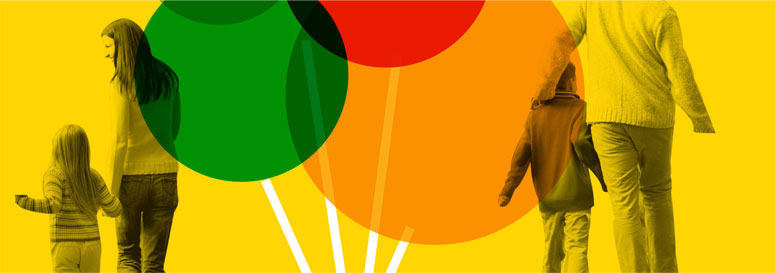"Delayed gratification" is the psychologist's way of saying "business before pleasure." A child who learns to delay gratification for a better outcome is a child well on his way to success in school and life. Studies as far back as the 1960s show that the ability to delay gratification is directly linked to success for kids. One way of learning whether a child understands delayed gratification is to give them a choice between a small treat now, and a bigger treat later. But parents can't really raise their kids with cookies. There's a difference between giving your child a reward, and teaching her the benefits of self regulation.
For example, you don't want your children to associate traveling with you with getting yelled at or with getting a triple scoop ice cream cone, especially if you must do so every day. You want them to enjoy learning how to regulate themselves, to enjoy time with you, and whatever you're doing together. But how do you get from pulling your hair out trying to navigate your day with them, to feeling successful as a parent, to helping them become smarter, more self sufficient and engaging people?
The secret is to strategize ahead of time. There are a series of steps to making a daily plan. Identify the known factors and the wild cards of your day and your children. Know your child, know her ups and downs, and her temperament. How long does he go before he's too tired to avoid a meltdown? What triggers her misbehavior?
Now think about what you want to do today, how long it will take, and how it syncs with your child's routine. Like any good plan, you should include a mental list of options to address potential trouble, mayhem and chaos that may arise. If your child tends to lose it right before nap time, make sure you have planned in a nap. And don't get mad if they fuss and cry when they're exhausted.
One helpful way to soothe your child and make the day run better is to save the most fun part of the day for after the trying parts. Let the child know what's going to happen, and when, so they don't feel confused or overwhelmed. For kids under 2, keep as close to routines as possible, stay calm, and distract and redirect when you can. For older children, let them know what the fun thing is going to be, and when it's going to happen. Give them a developmentally appropriate responsibility during the less fun times, like shopping. Even a toddler can help you find the orange box in the detergent aisle. Tell children ahead of time that you will not be buying candy, and never deviate from that, no matter what. The more consistent you are with what you say, and how you schedule, the less often you will see misbehavior.
This doesn't mean bribe your child with the promise of your attention. In fact, it's better not to associate this fun time with their behavior at all. Reading their favorite book with you, stopping at the playground for some exercise, or helping you choose her favorite cereal at the grocery are examples of positive schedule enders. It can be soothing to an upset child to simply say, don't forget, we're going to say hi to the doggie on the way home, or mommy will be coming home when we do! The more time you spend with your child, the better you'll be able to anticipate difficult moments and avoid them. The older your child gets, the more self regulation skills they will learn, from you, from their caregivers, teachers and peers. Remind yourself of this when you're about to melt down, yourself. That's a fun time for parents to plan for at the end of a child's day, or at the end of a trying developmental stage. In other words, your own ability to delay gratification and look forward to positive outcomes, will help you behave better, too!




